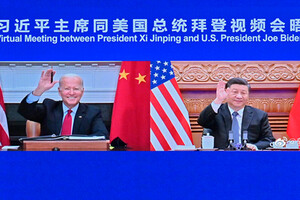Beijing can significantly increase its international prestige if the Russian war against Ukraine ends.

At the beginning of the 20th century Russian-Japanese the war became more and more bloody. At this point, the leader of a country that has never played a role in the global arena has decided to become a peacemaker. After the deaths of more than 100,000 Russian and Japanese soldiers at the Battle of Mukden, the Tsar of Russia and the Emperor of Japan were ready to respond to a proposal by President Theodore Roosevelt.
He suggested that each of the leaders send a representative to the United States to negotiate a peace agreement. Could Chinese leader Xi Jinping use Roosevelt's recipe and end the war in Ukraine? About this writes Washington Post.
There are many differences between the United States, led by Roosevelt in 1905, and modern-day China, which is ruled by Xi. But historical analogies are not recipes that need to be followed step by step to achieve the desired result. However, the similarities between the two leaders and the opportunities that history offers are instructive. In the early 1900s, the United States was just beginning to gain influence in the Western Hemisphere. However, they have never played a central role in international relations. Roosevelt did not have a particularly warm relationship with either the Japanese emperor or the Russian tsar. But he was confident that he could negotiate with any leader on an equal footing. The United States was not yet a major military power. But Roosevelt wanted the US Navy to travel to all corners of the world, including the seas between Russia and Japan. Also in those days, the United States became a major trading partner.
Today, history has given Xi much stronger cards if he dares to play them. First, China has much closer relations with Russia and Ukraine than the United States had with Russia and Japan 100 years ago. Also, given Xi Jinping's personal relationship with both Vladimir Putin and Vladimir Zelensky, as well as the high stakes for both, neither will turn down an invitation to Beijing. As a major trading partner for both Moscow and Kyiv, China also has powerful leverage to persuade both of them to compromise.
Second, China's diplomatic stance strengthens Beijing's role as a mediator. After the Russian invasion, China could not formulate its public position for a long time. On the one hand, Russia's attack violates the principles of sovereignty and territorial integrity that Beijing sees as pillars of international politics. On the other hand, China did not want to push back the country with which Xi declared a “boundless” partnership. This awkward diplomatic position now gives the Chinese leader room for maneuver to negotiate an agreement.
Read also: China will seek peace in Ukraine “in its own way” – Prime Minister
Beijing also has strong incentives to end the war in Ukraine. Russia's invasion and powerful Western reaction are undermining the global economy. Supply chains are breaking and energy prices are rising at a record high, creating uncertainty in financial markets. All this reduced the forecasts for global economic growth by 0.8% or $ 700 billion. As the world's largest consumer of energy and exporter of goods, China risks losing more because of this war than anyone who is not directly involved. Remembering the financial crisis of 2008, which almost became the second Great Depression, Chinese leaders are justifiably worried about the risks to the global financial system. Premier Li Keqiang recently acknowledged that China's economy is facing an increasingly “harsh” environment.
China's peace initiative in Ukraine could also enhance China's global prestige. The storm created by Putin's brutal aggression, Ukraine's fierce resistance, and the West's mobilization to turn Russia into a party will shape geopolitics for decades. The publication recalls that three weeks before the Russian invasion of Ukraine, Xi Jinping met with Putin. Because of this, China began to be accused of being “just another Russia with Chinese characteristics.” So that Putin's toxicity does not poison Xi and Beijing, it would be prudent to pursue a policy that goes beyond just calling for an end to the fighting.
Such an initiative will require training, and countless “devils” are in the details. Should China act unilaterally or invite the United States to act together? If these rivals can work together as peacekeepers, it could help both sides realize the need for operational cooperation to reduce the risks of future confrontations, particularly through Taiwan. It is also necessary to choose the right moment for China's peace initiative. But recent changes in Russia's military campaigns, as well as signals of Zelensky's readiness to make some concessions, say that this time is not far off.
At the signing of the Russia-Japan peace agreement, Roosevelt said: Russia, and extremely good for Japan. ” If Xi Jinping can achieve peace in Ukraine, it will definitely be very good for the whole world.
Earlier, the New York Times wrote that China sees one winner in the war in Ukraine – itself. The country's leadership thinks that it will be able to avoid economic and diplomatic consequences, as well as present its country as a guarantor of stability
See special topic: For the first time since Ukraine, Ukraine will receive anti-ship missiles. The third exchange of prisoners took place between Ukraine and Russia – Vereshchuk 12 Ukrainian servicemen and 14 civilians are returning home. Why not return to Kyiv now: reasons If possible, wait to return, city officials ask. The European Investment Bank will provide financial assistance to countries hosting Ukrainian refugees The new program is currently awaiting approval by the EIB's Board of Directors Near the Border Troops of the Russian Federation again hit the tank with nitric acid The head of the Luhansk OVA urged residents not to come out of hiding.




